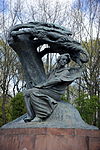Henryk Sienkiewicz Monument (Warsaw)
2000 establishments in Poland2000 sculpturesBronze sculptures in PolandBuildings and structures completed in 2000Henryk Sienkiewicz ... and 6 more
Monuments and memorials in WarsawOutdoor sculptures in WarsawStatues of men in PolandStatues of writersStone sculpturesUjazdów, Warsaw

Henryk Sienkiewicz Monument (Polish: Pomnik Henryka Sienkiewicza) is a sculpture in Warsaw, Poland, within the neighbourhood of Ujazdów in the Downtown district, in the western part of the Royal Baths Park. It has a form of a bronze statue of Henryk Sienkiewicz, a 19th- and 20th century novel writer, placed on a syenite pedestal. The sculpture was designed by Gustaw Zemła and unveiled on 5 May 2000.
Excerpt from the Wikipedia article Henryk Sienkiewicz Monument (Warsaw) (License: CC BY-SA 3.0, Authors, Images).Henryk Sienkiewicz Monument (Warsaw)
Aleje Ujazdowskie, Warsaw Midtown
Geographical coordinates (GPS) Address External links Nearby Places Show on map
Geographical coordinates (GPS)
| Latitude | Longitude |
|---|---|
| N 52.215625 ° | E 21.027022222222 ° |
Address
Henryk Sienkiewicz
Aleje Ujazdowskie
00-583 Warsaw, Midtown
Masovian Voivodeship, Poland
Open on Google Maps










